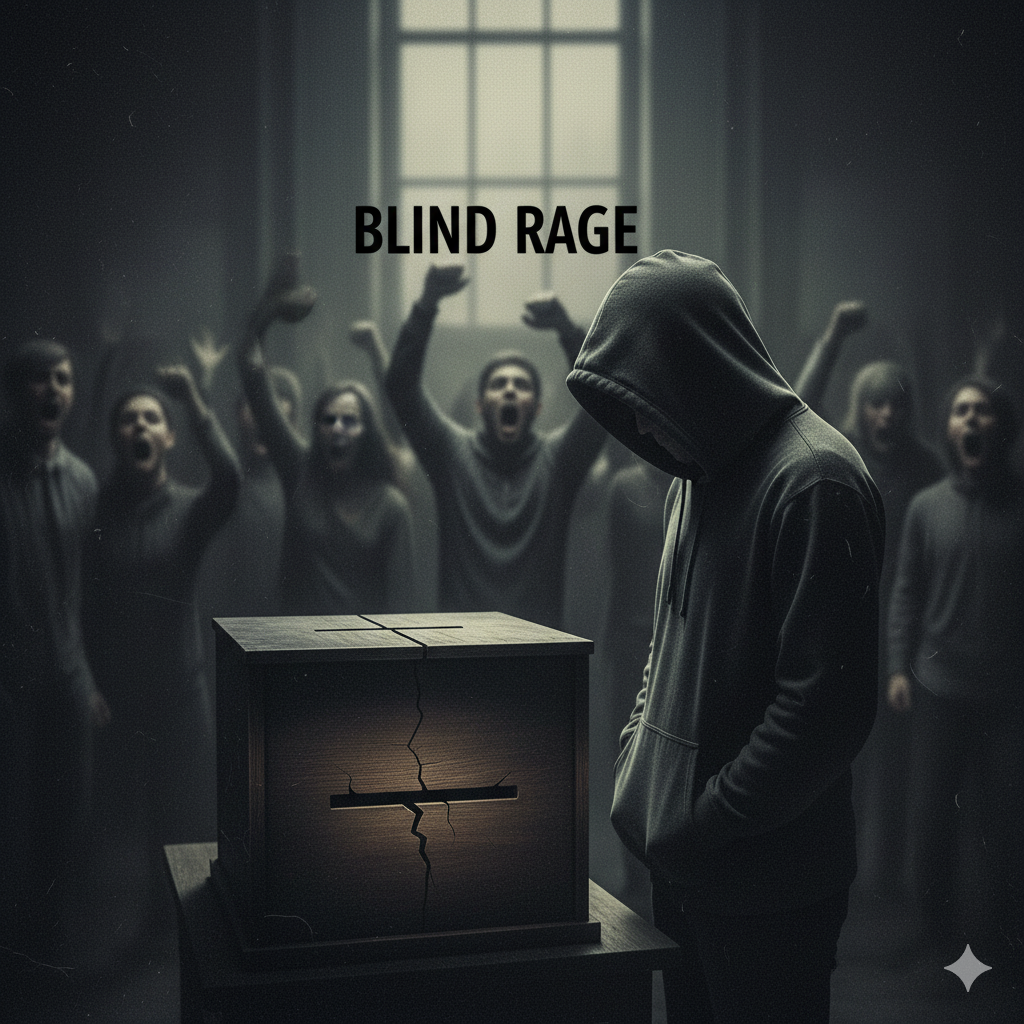Essays and Conversations on Community & Belonging
The Fractured Vote: Faith, Futility, and the New Hysteria
Dive into America's democratic crisis. This essay argues the "moral duty to vote" is moot. From CA's Prop 50 to Cuomo's ballot maneuvers, the political machine rigs choice. The corruption runs deeper: events like Charlie Kirk's tragic assassination, combined with long early voting periods, transform civic participation into "blind rage voting." Discover why a rational vote is impossible in a system that limits options and a culture prone to hysteria.
SOCIAL & POLITICAL COMMENTARYSYSTEMS & INCENTIVESTHE FRACTURED REPUBLICTHE VOIDCRISIS OF LIBERALISM
Alex Pilkington
11/4/20254 min read
In the quiet, wood-paneled halls of academia, a quaint debate persists: Is it our moral duty to vote? The ethicist Dr. Julia Maskivker, holding to a now-ancient-seeming faith in the polis, argues for a “natural duty of aid,” insisting that the ballot is our sole civilized tool for installing competent leaders. Against this, Dr. Chris Freiman offers the cold, rationalist counter: the individual vote is statistically meaningless, a gesture of futility. To fulfill a "moral duty," he suggests, one should do something tangible—serve in a soup kitchen, perhaps—rather than participate in a collective lottery.
This debate, with its Enlightenment-era assumptions of a rational citizen and a responsive system, feels like a dispatch from another century. It floats high above the rancid, chaotic reality of American politics as we live it, a reality defined not by reason but by systemic corruption and psychic breakdown. The question of why we should vote is meaningless if the act of voting is a pre-rigged farce, and if the voter is no longer a rational citizen but a traumatized member of a warring tribe.
The debate is over. The machine has won, and the soul has fled.
We see the machine bared, with shocking candor, in California's Proposition 50. This is not a subtle erosion of norms; it is a brazen act of contempt for the individual citizen by the state's political cartel. In 2010, the people of California, in a rare act of populist wisdom, stripped the legislature of the power to draw its own districts, correctly identifying that politicians should not be allowed to choose their own voters. They established an independent citizens’ commission, a firewall against the raw self-interest of the political class.
Now, that same class, led by Governor Newsom, is demanding the power back.
The justifications for this power grab are almost comically corrupt. They claim this is a "temporary" measure, a necessary "retaliation" against Republican gerrymandering in Texas. This is the argument of the arsonist demanding more matches. As Carl DeMaio's "No on Prop 50" campaign rightly identifies, this is the state "seizing power from citizens" to "rig the system" for their own "corrupt backroom deals." It is a $200 million special election—called while the state drowns in a $20 billion deficit—designed for one purpose: to destroy competitive elections and entrench the incumbents of the ruling party.
This California power grab is not an isolated scheme; it is a tactic perfected by the duopoly nationwide. In 2020, New York's then-Governor Andrew Cuomo executed a similar, cynical maneuver. He buried a provision in the state's must-pass budget bill that effectively annihilated the state's minor parties. The law instantly raised the threshold to stay on the ballot from a manageable 50,000 votes for governor every four years to an onerous 2% of the presidential and gubernatorial vote. The hypocrisy was breathtaking: party leaders simultaneously pleaded with voters not to cast a "protest vote" for a third party due to the stakes of the presidential election, while their new law required that very vote as the price for a party's survival. It was a perfectly engineered catch-22, justified by the fraudulent claim that public funding for minor parties would be too costly—a claim political analyst Richard Winger notes is a lie, as courts already permit funding discrimination. The new law's true purpose, like Prop 50's, was to make the cost of re-entry—requiring potentially half a million signatures—so impossibly high as to guarantee a permanent monopoly.
This, then, is the libertarian nightmare made manifest: from Newsom in California to Cuomo in New York, the state acts not as a neutral arbiter but as a monopoly interest, crushing the "market" of political choice to guarantee its own survival. These maneuvers validate every word of Freiman's futility argument. Why perform a "duty" when the outcome has been so openly engineered against you? The vote is not an expression of will; it is ratification of the cartel.
This systemic rot, this open mockery of democratic-republican virtue, is one half of our crisis. The other half is what it has done to our soul.
As the structural integrity of the republic has dissolved, the psychological stability of its citizens has gone with it. The political has become the personal, and the personal has become the hysterical. We no longer inhabit a shared country; we huddle in digital tribes, marinated in a constant, low-grade fever of mutual loathing.
Into this psychic tinderbox falls the new, destabilizing mechanic of the "month-long Election Day." Early voting, which began in September, has decoupled the act of voting from a single, shared moment of civic reflection. It has, instead, created a long, vulnerable window where a national trauma can hijack the entire process.
The assassination of Charlie Kirk on September 10, 2025, is the event that proves the thesis. This political murder, this horrific act of violence, did not just shock the nation; it became the entire context for the early vote. In the days and weeks that followed, millions of ballots were cast not in a state of reason, but in a state of "blind rage voting."
This is not the fulfillment of Maskivker's "duty of aid." It is a visceral, tribal spasm. It is a vote cast from the id, an expression of pure grief, fear, and rage. It is a scream, not a decision. The parallel to Robert F. Kennedy's assassination in 1968 is both obvious and incomplete. The 1968 murders of RFK and MLK broke the nation's heart and threw the political process into chaos, leading to the despair of the Chicago convention. But in 2025, that raw, immediate wound is not processed; it is weaponized. The rage is funneled, instantly and irrevocably, into the ballot box.
The modern citizen is thus trapped. The system (Prop 50, Cuomo's Law) offers a choice that is a cynical illusion, an unfree market rigged by state actors. And the culture (the Kirk assassination) has so poisoned the well of our common life that the voter is no longer capable of reason, driven only by the "madness of crowds."
The debate over the moral duty to vote is a luxury we can no longer afford. It is a meaningless question to ask of a person who is offered a rigged choice and in any case, is too blinded by rage and grief to see it. The real crisis is not that the citizen has abandoned his duty; it is that the republic has abandoned the citizen, leaving him powerless before the machine and hostage to his own, cultivated despair.





